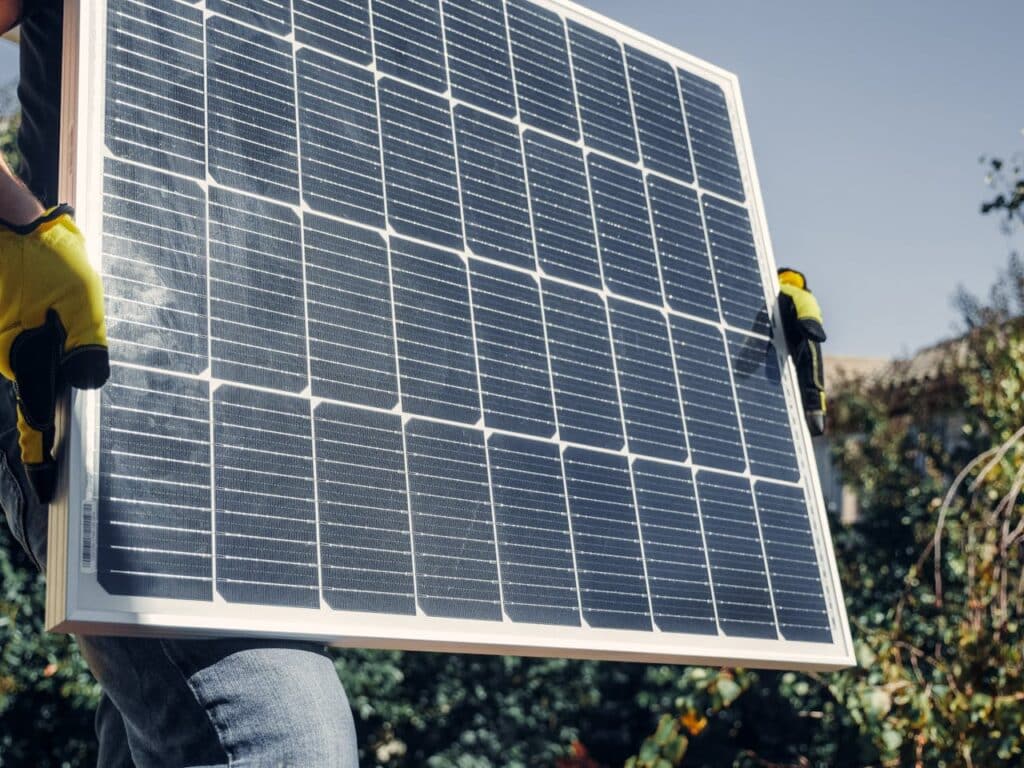Maintaining the cleanliness of your solar panels is essential for ensuring optimal performance and efficiency. Dirt, dust, bird droppings, and other debris can accumulate on the surface of the panels, reducing their ability to absorb sunlight and generate solar power.
This guide will explain how to clean your solar panels effectively, maintaining the efficiency of your solar panel system.
Why Clean Your Solar Panels?
Impact on Panel Efficiency
Dirty solar panels can significantly reduce the efficiency of your solar PV system. When debris covers the surface of the panels, it blocks sunlight and diminishes the panels’ ability to convert solar energy into electrical power. Regular solar panel cleaning can help maintain the efficiency of solar panels and ensure they operate at peak performance.
When To Clean Your Solar Panels
It’s important to assess the cleanliness of your solar panels periodically. If you notice a decrease in energy production or visible dirt and grime, it may be time to clean your panels.
Typically, cleaning once or twice a year is sufficient, but more frequent cleaning may be necessary in areas with heavy dust, pollen, or bird activity.
How to Clean Your Solar Panels
Safety First
Before you start cleaning your solar panels, ensure that you follow safety precautions. If your panels are on the roof, consider hiring professional panel installers or cleaners who have the appropriate safety equipment and experience.
Basic Cleaning Equipment
To clean your solar panels, you will need the following basic cleaning equipment:
- Garden hose
- Soft brush or sponge
- Mild soap or detergent (if necessary)
- Water
Cleaning Process
- Turn Off Your Solar Panel System: Before you begin cleaning, turn off your solar panel system. This ensures safety and prevents any potential electrical issues.
- Rinse with a Garden Hose: Use a garden hose to gently rinse the surface of the panels with water. This helps remove loose dirt and debris. Avoid using high water pressure, as it can damage the panels and affect their efficiency.
- Scrub with a Soft Brush: For stubborn dirt or bird droppings, use a soft brush or sponge to gently scrub the surface of the panels. Avoid using abrasive materials that could scratch the panels. If necessary, use a mild soap or detergent mixed with water to aid in cleaning.
- Rinse Again: After scrubbing, rinse the panels thoroughly with the garden hose to remove any soap residue.
- Dry the Panels: Allow the panels to air dry. Alternatively, use a soft cloth to gently wipe them dry, ensuring no water spots are left behind.
Tips for Effective Cleaning
- Early Morning or Late Evening: Clean your panels during the early morning or late evening when the panels are cool. Cleaning during hot, sunny periods can cause water to evaporate quickly, leaving streaks and spots.
- Avoid Hard Water: If your water source is hard water, it may leave mineral deposits on the panels. Use distilled water or a water softener to prevent this.
- Regular Inspection: Regularly inspect your panels for dirt and debris build-up. Address any issues promptly to maintain panel efficiency.
When to Call Professionals
While basic cleaning can be done by homeowners, there are instances where professional cleaning may be necessary. If your panels are difficult to access, if you notice significant build-up of dirt or grime, or if you prefer a thorough cleaning by experts, contact professional solar panel installers or cleaners. They have the experience and tools needed to ensure your panels are cleaned safely and effectively.
The Importance Of Keeping Your Solar Panels Clean
Keeping your solar panels clean is crucial for maintaining the efficiency of your solar PV system. Regular cleaning with a garden hose, soft brush, and mild soap can help remove dirt, bird droppings, and other debris, ensuring your panels generate the maximum amount of solar power. Remember to follow safety precautions and consider professional help if needed.
At PV Recycling, we provide recycling services for large volumes of solar panels, inverters and batteries nationwide. Contact us for more information on how we can assist you in recycling your waste responsibly when they reach the end of their lifecycle.

